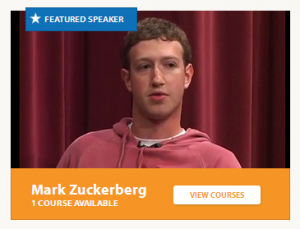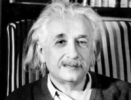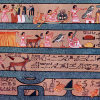 I'm very excited to announce that the OEDb has just launched a massive Free Online Open Courses Directory organizing nearly 10,000 free courses in the liberal arts and sciences. The free courses are available in a variety of formats including full courses, video lectures, audio lectures, text articles, and mixed media.
I'm very excited to announce that the OEDb has just launched a massive Free Online Open Courses Directory organizing nearly 10,000 free courses in the liberal arts and sciences. The free courses are available in a variety of formats including full courses, video lectures, audio lectures, text articles, and mixed media.
The courses are searchable and cover everything from Adobe Photoshop to 20th Century Literature in the following subject areas:
- Arts
- Business
- Education
- Engineering & Computers
- Liberal Arts
- Math
- Medicine
- Science
Here are ten that I'd like to take:
-
 Learn How To Put On Your Own Webinar – This course is a comprehensive "How To" on webinars. You will learn about the different types of webinars and how to create each type. You will learn about what webinar tools are available both paid and free resources.
Learn How To Put On Your Own Webinar – This course is a comprehensive "How To" on webinars. You will learn about the different types of webinars and how to create each type. You will learn about what webinar tools are available both paid and free resources. -
 Artificial Intelligence- Introduction to Robotics – The purpose of this course is to introduce you to basics of modeling, design, planning, and control of robot systems. In essence, the material treated in this course is a brief survey of relevant results from geometry, kinematics, statics, dynamics, and control.
Artificial Intelligence- Introduction to Robotics – The purpose of this course is to introduce you to basics of modeling, design, planning, and control of robot systems. In essence, the material treated in this course is a brief survey of relevant results from geometry, kinematics, statics, dynamics, and control. -
 Exploring Black Holes – Study of physical effects in the vicinity of a black hole as a basis for understanding general relativity, astrophysics, and elements of cosmology. Extension to current developments in theory and observation. Energy and momentum in flat spacetime; the metric; curvature of spacetime near rotating and nonrotating centers of attraction; trajectories and orbits of particles and light; elementary models of the Cosmos.
Exploring Black Holes – Study of physical effects in the vicinity of a black hole as a basis for understanding general relativity, astrophysics, and elements of cosmology. Extension to current developments in theory and observation. Energy and momentum in flat spacetime; the metric; curvature of spacetime near rotating and nonrotating centers of attraction; trajectories and orbits of particles and light; elementary models of the Cosmos. -
 Introduction to Quantum Mechanics– This course explains the fundamentals of modern physics with special emphasis on quantum mechanics. It covers key concepts of quantum mechanics. The basic principles of statistical physics and solid state physics are also described based on the quantum mechanics. Topics include wave and particle duality, history of formation of quantum mechanics, Schrodinger equation, tunneling phenomenon, atomic model of hydrogen and molecular energy levels. Maxwell-Boltzmann distribution, Bose-Einstein distribution and Fermi-Dirac distribution are also explained. The basic concepts related to solid state physics that are essential in understanding semiconductor physics are also covered in the course.
Introduction to Quantum Mechanics– This course explains the fundamentals of modern physics with special emphasis on quantum mechanics. It covers key concepts of quantum mechanics. The basic principles of statistical physics and solid state physics are also described based on the quantum mechanics. Topics include wave and particle duality, history of formation of quantum mechanics, Schrodinger equation, tunneling phenomenon, atomic model of hydrogen and molecular energy levels. Maxwell-Boltzmann distribution, Bose-Einstein distribution and Fermi-Dirac distribution are also explained. The basic concepts related to solid state physics that are essential in understanding semiconductor physics are also covered in the course. -
 Greek and Roman Mythology – Myths are traditional stories that have endured over a long time. Some of them have to do with events of great importance, such as the founding of a nation. Others tell the stories of great heroes and heroines and their exploits and courage in the face of adversity. Still others are simple tales about otherwise unremarkable people who get into trouble or do some great deed. What are we to make of all these tales, and why do people seem to like to hear them? This course will focus on the myths of ancient Greece and Rome, as a way of exploring the nature of myth and the function it plays for individuals, societies, and nations.
Greek and Roman Mythology – Myths are traditional stories that have endured over a long time. Some of them have to do with events of great importance, such as the founding of a nation. Others tell the stories of great heroes and heroines and their exploits and courage in the face of adversity. Still others are simple tales about otherwise unremarkable people who get into trouble or do some great deed. What are we to make of all these tales, and why do people seem to like to hear them? This course will focus on the myths of ancient Greece and Rome, as a way of exploring the nature of myth and the function it plays for individuals, societies, and nations. -
 Arthurian Literature and Celtic Colonization – The course examines the earliest emergence of stories about King Arthur and the Knights of the Round Table in the context of the first wave of British Imperialism and the expanded powers of the Catholic Church during the twelfth and thirteenth centuries. The morphology of Arthurian romance will be set off against original historical documents and chronicle sources for the English conquests in Brittany, Wales, Scotland, and Ireland to understand the ways in which these new attitudes towards Empire were being mythologized.
Arthurian Literature and Celtic Colonization – The course examines the earliest emergence of stories about King Arthur and the Knights of the Round Table in the context of the first wave of British Imperialism and the expanded powers of the Catholic Church during the twelfth and thirteenth centuries. The morphology of Arthurian romance will be set off against original historical documents and chronicle sources for the English conquests in Brittany, Wales, Scotland, and Ireland to understand the ways in which these new attitudes towards Empire were being mythologized. -
 Ancient Egyptian Deities -These are the gods and goddesses who were worshiped in ancient Egypt mythology. There are many deities in the ancient Egyptian pantheon and this is just a selection. Even then, it all gets a bit obscure by the final level, so you might like to try just one or two. It kicks off with the big names, then the funerary world, the creatures and beasties, and, finally, some of the ‘supporting cast'.
Ancient Egyptian Deities -These are the gods and goddesses who were worshiped in ancient Egypt mythology. There are many deities in the ancient Egyptian pantheon and this is just a selection. Even then, it all gets a bit obscure by the final level, so you might like to try just one or two. It kicks off with the big names, then the funerary world, the creatures and beasties, and, finally, some of the ‘supporting cast'. -
 Cryptography – Cryptography is essentially the science of writing in secret code. In data and telecommunications, cryptography has specific security requirements, such as authentication, privacy or confidentiality, integrity, and non-repudiation. To meet these security requirements, we employ secret key (or symmetric) cryptography, public-key (or asymmetric) cryptography, and hash functions. This course will focus on public key cryptography, which is best exemplified by the RSA algorithm (named after the algorithm inventors Rivest, Shamir, and Adleman). The RSA algorithm is considered particularly strong due to the fact that it relies on prime factorization, a computationally difficult process.
Cryptography – Cryptography is essentially the science of writing in secret code. In data and telecommunications, cryptography has specific security requirements, such as authentication, privacy or confidentiality, integrity, and non-repudiation. To meet these security requirements, we employ secret key (or symmetric) cryptography, public-key (or asymmetric) cryptography, and hash functions. This course will focus on public key cryptography, which is best exemplified by the RSA algorithm (named after the algorithm inventors Rivest, Shamir, and Adleman). The RSA algorithm is considered particularly strong due to the fact that it relies on prime factorization, a computationally difficult process. -
 Ancient Philosophy and Mathematics – Western philosophy and theoretical mathematics were born together, and the cross-fertilization of ideas in the two disciplines was continuously acknowledged throughout antiquity. In this course, we read works of ancient Greek philosophy and mathematics, and investigate the way in which ideas of definition, reason, argument and proof, rationality and irrationality, number, quality and quantity, truth, and even the idea of an idea were shaped by the interplay of philosophic and mathematical inquiry.
Ancient Philosophy and Mathematics – Western philosophy and theoretical mathematics were born together, and the cross-fertilization of ideas in the two disciplines was continuously acknowledged throughout antiquity. In this course, we read works of ancient Greek philosophy and mathematics, and investigate the way in which ideas of definition, reason, argument and proof, rationality and irrationality, number, quality and quantity, truth, and even the idea of an idea were shaped by the interplay of philosophic and mathematical inquiry. -
 Introduction to Magic: The Gathering – Introduction to Magic: the Gathering is a six week course intending to create a framework for new players to learn and enter the world of Magic: the Gathering. At the end of the six weeks, students will understand how to interpret cards, where and how to play, basic interactions, phases of a game, and proper etiquette for Magic: The Gathering.
Introduction to Magic: The Gathering – Introduction to Magic: the Gathering is a six week course intending to create a framework for new players to learn and enter the world of Magic: the Gathering. At the end of the six weeks, students will understand how to interpret cards, where and how to play, basic interactions, phases of a game, and proper etiquette for Magic: The Gathering.